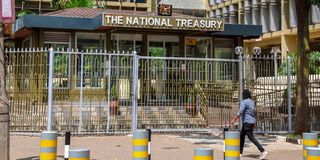
The National Treasury building in Nairobi. The Sh6 billion in Value Added Tax (VAT) exemptions granted by the National Treasury in 2024 to various investors run the risk of being declared illegal.
The Sh6 billion in Value Added Tax (VAT) exemptions granted by the National Treasury in 2024 to various investors run the risk of being declared illegal unless the National Assembly addresses an error in the drafting of the Tax Laws Amendment Act of 2024.
The National Treasury did not include a transitional clause in the Tax Laws Amendment Act of 2024 to cushion the investors who got the exemptions before the law came into force on December 27, 2024—exposing them to the likelihood of demand to pay back the exemptions.
The National Treasury now wants the drafting error fixed through the VAT (Amendment) Bill 2025 that is currently before the Finance and National Planning Committee of the National Assembly for stakeholder input.
“The first schedule to the VAT Act is amended in paragraph 146 of part 1 by deleting the words 12 months after this date and substituting, therefore, the word 12 months from the date of the commencement of the Act,” proposes the VAT (Amendment) Bill 2025 by Leader of Majority in Parliament Kimani Ichung’wah.
The Tax Laws (Amendment) Act, which became operational on December 27, 2024, amended the first schedule of the VAT Act to provide that exemptions be granted to an investment provided that its investment value is not less than Sh2 billion.
But what brought ambiguity in the law, that the National Treasury now wants cured, is the provision that states, “Provided the exemption was granted before January 1, 2024 and shall continue to apply for 12 months after this date,” an indication that the mandarins at the National Treasury applied it retrospectively.
Already the Finance Committee members and the Institute of Certified Public Accountants of Kenya (ICPAK) fear that the investors who got the exemptions may be forced to pay them back without the transitional arrangements.
“I am still at a loss as to how and why the law was applied retrospectively. Does it not imply that those who got the exemptions will be compelled to pay back?” Homa Bay Town MP Peter Kaluma questioned.
Mr Joseph Ngugi, the deputy director of the Macro and Fiscal Affairs Department of the National Treasury, warned that those who benefited from the exemption before December 27, 2024 will be affected.
“It affects the exemptions granted before the law became operational,” said Mr Ngugi adding, “Gradually, we will remove all the exemptions every year as it has been eroding what we collect.”
Kitui Rural MP David Mwalika, who chaired the committee session, demanded that the National Treasury furnish the committee with a list of the companies that benefited from the Sh6 billion exemption and the investments they brought into the country during the period.
To safeguard the investors granted the exemptions in 2024, Mr Fredrick Kimotho, a council member at ICPAK, wants the law amended to include “provided that the…the exemption was granted before January 1, 2025 and shall continue to apply for 12 months from January 1, 2025.”
“ICPAK recommends a revision to ensure that the transitional period is clear, effective, and aligned with the legislative intent,” said Mr Kimotho adding, “With these adjustments, the amendment could better stimulate investment in the manufacturing sector.”
The 2024 Economic Survey by the Kenya National Bureau of Statistics (KNBS) shows that the manufacturing sector in the country experienced “moderate” growth in 2023 with an increase of 2 percent compared to 2.6 percent in 2022.
The survey further reveals that the sector’s contribution to the GDP has been on a decline from 10 percent in 2013 to 7.6 percent in 2023, reflecting a reduction of about 29 percent.











